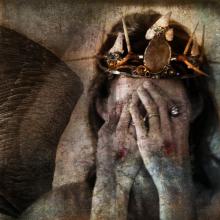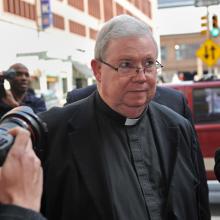sex abuse scandal
I first became aware of the realities of sexual abuse in the church at the tender age of five. I happened to look at the television screen and witnessed police officers escorting my hand-cuffed youth minister in front of a crowd of reporters screaming questions. The words “YOUTH PASTOR ABUSED CHILDREN” flashed across the television screen.
I was confused and scared. My family comforted and assured me that the pastor had only “hurt” teenage boys and that I was safe. The church hired a new minister and, on the surface, life seemed to resume to normal for our congregation. But as a child I had no idea of the effects of the abuse and its aftermath had on the survivors, their families, and our church community. Many families soon experienced disintegrating marriages, friendships were broken, and faith was lost. One survivor’s family had their home repeatedly vandalized and were forced to move hundreds of miles from our town to escape fellow believers who grew angry with them for filing a lawsuit against the perpetrator.
Church leaders shunned media attention and feared “airing dirty laundry” in public, encouraging members to keep the experience a secret for the sake of the boys and church. As a child, and then a teenager, growing up in an otherwise loving, connected church, I never remember hearing church leaders address this aspect of our shared history in the open. To some of the survivors and the broken-hearted, the silence on this topic was welcome; to others it was deafening. While secrecy was the rule, the legacy of the abuse was real and active in the community. Rather than being cared for with dignity and love, the survivors and their families felt that they were a shameful secret to be whispered about and hidden. I learned as an adult that I was intimately connected with some of the survivors but never knew about their silent pain. I had no idea that I was a participant in a culture of silence and shame that often surrounds sexual abuse and is especially pronounced when boys are abused by men in the church.
The U.S. Catholic bishops' point man on sexual abuse has said that the hierarchy's credibility on fixing the problem is "shredded" and that the situation is comparable to the Reformation, when “the episcopacy, the regular clergy, even the papacy were discredited.”
Bishop R. Daniel Conlon of Joliet, Ill., last month told a conference of staffers who oversee child safety programs in American dioceses that he had always assumed that consistently implementing the bishops’ policies on child protection, “coupled with some decent publicity, would turn public opinion around.”
Monsignor William J. Lynn, the first U.S. Catholic official convicted for covering up the sexual abuse of children, was sentenced to 3-6 years in prison on Tuesday.
Lynn, 61, has been in jail since his June 22 conviction on endangering the welfare of a child. Prosecutors were seeking the maximum penalty, up to seven years.
“You knew full well what was right, Monsignor Lynn, but you chose wrong,” said Common Pleas Court Judge M. Teresa Sarmina.
Sarmina told Lynn that he enabled “monsters in clerical garb … to destroy the souls of children, to whom you turned a hard heart.”
Lynn was head of priest personnel for a dozen years and was one of the highest-ranking officials in the Archdiocese of Philadelphia.
The sexual abuse scandal has tarnished the image of the priest and contributed to a crisis of priestly vocations in the Roman Catholic Church, the Vatican said on June 25, while also faulting a widespread “secularized mentality” and parents' ambition for their children, which leaves “little space to the possibility of a call to a special vocation.”
The “Pastoral Guidelines for Fostering Vocations to Priestly Ministry” were prepared over the last seven years by the Vatican's Congregation for Catholic Education.
The document says candidates to the priesthood shouldn't be accepted if they show “signs of being profoundly fragile personalities,” and says future priests should learn the “importance” of their future commitments, “in particular with regard to celibacy.”
Amy and I have been working (translated: watching lazily) our way through the first several seasons of Mad Men. The writing is remarkably subtle, and I was particularly struck by the fact that such a long-standing show could effectively have little or no plot focusing instead on rich character development.
For a writer, this is like enjoying a gourmet meal every night.
But the cherry on top for me is the sprinkling of anachronisms that apparently made plenty of sense at the time, but which are shockingly out of place now. There was a scene of the main family in the park, and when they’re done, the mother gives the blanket a good flick and leaves all of their trash wherever it falls. There’s also the constant smoking, even around kids and by pregnant wives (the perfect antidote for nausea, apparently), drinking at work and brazenly racist comments as the cultural norm.
Hard to believe sometimes that this took place so recently that my parents were teenagers when it took place.


